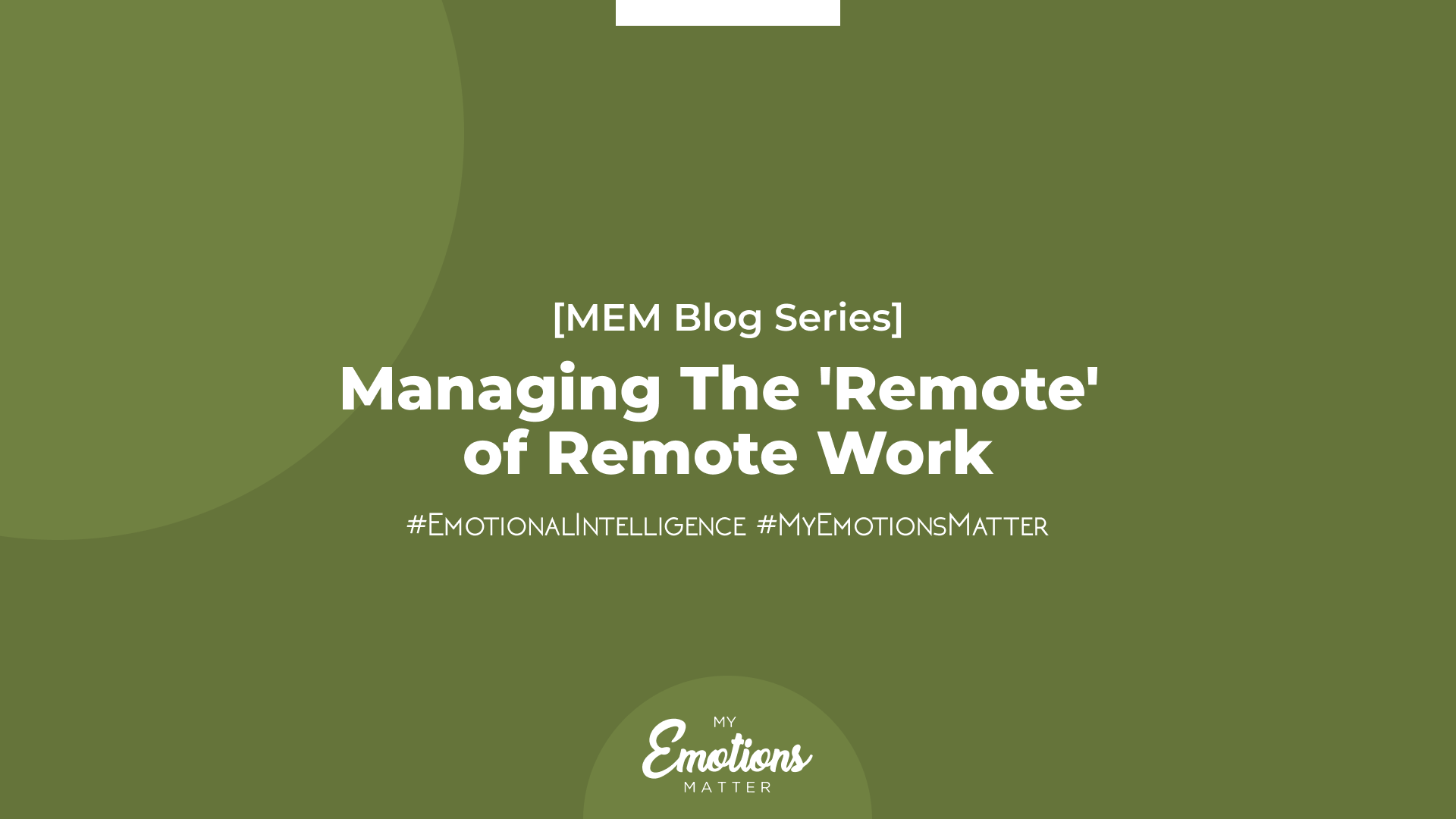Managing The 'Remote' of Remote Work
With the current onset of the corona virus pandemic, one change that I have seen in the lives of working professionals is the transition where people are now having to work from home not by choice but by compulsion.
While the trend of working remotely had begun before the pandemic and a few people used to work from home earlier as well, after the pandemic, many organizations, if not all, have shifted to this way of working. One thing which makes this transition very distinguishing is the fact that, at this period of lockdown, it’s just not one or two employees from an organization that are working from home but the whole organization itself has transitioned into working from home.
We at My Emotions Matter help organizations develop Emotionally Intelligent workplace climate and we realized that it is essential to capture this transition and understand the challenges and opportunities brought upon organizations and their employees in this phase where people are bound to work from home. Hence, we interviewed six working professionals who have molded their ways of working to fit the work-from-home style.
One thing which could be found in common in most of the answers was that, while working from home, people who live with their families are getting more time with their family members. Living with family members has become both a boon and a bane for people working from home.
As Ms. Vandana Poddar, Key Account Manager for Digital Goods at Daraz explained, “For me, one of the major advantages of working from home has been that I get to spend more quality time with my family members as none of us are allowed to go out. So, it makes me feel heartwarming and nostalgic both at the same time as I often feel like the good old times are back.”
Getting more quality time with her family has helped Ms. Poddar rejuvenate herself. And things like this are helpful to both her and her organization. Due to the strong emotional support that Vandana is receiving during this vulnerable time, she is able to experience positive emotions like joy and satisfaction even in this crisis.
I too have been noticing that my bond with my family members has improved during this period of quarantine. I can find myself understanding the needs of my parents and taking steps so that I can be of help to them when they fulfill their needs. For instance, I have now come to the realization that given this period of lockdown, the work pressure has increased for my mother as well who is a home-maker. She is now expected to serve a family of five people continuously which leaves her with little time to herself. I have become more mindful about this and I now ensure that I help her with household chores whenever possible and this has helped me and my mother bond well together.
While I do try to help my mom with the household chores, one thing I often tend to struggle with is striking that balance between work life and family life because when I feel like I am being a good daughter, I also have the feeling that I am being less of a committed employee to the organization and vice versa.
After conducting an interview with Ms. Utsaha Khakurel, Business Development Manager at Naagiko Honey, I could absolutely understand and relate to her condition. Ms. Utsaha added, “When working from home, I feel that I am not being effective. I lack a sense of accomplishment. And in some situations when the flow of my work gets disturbed or disrupted due to any demand of my family members, I feel agitated. I sometimes wish I could get my work done in a professional environment itself as that wouldn’t disturb the flow of work.”
Ms. Utsaha had taken a session from My Emotions Matter which was titled ‘Managing Relationships’. After that session, Ms. Utsaha came to realize that the reason behind her agitation was that her need for focused work wasn’t being fulfilled. Hence, she is now slowly taking baby steps towards communicating her needs to her parents. She has come to realize that her parents are not going to understand her needs automatically and she is responsible for explaining it to them. So, now she tries to explain the intensity of her work to her parents. She explains the repercussions she might have to face if any of her work slips off in deadlines and by explaining these repercussions she convinces her parents to give her space when she is working. She feels that this initiative being taken by her – whereby she communicates when she needs space to her parents has been working out in her favor as well.
After listening to Ms. Utsaha’s story, it left me motivated to communicate my needs to my family members as well.
One thing which personally works for me when communicating with my family members is letting them know when I am going to be available to spend time with them. My father is someone who is very fond of playing board games with me and ever since this lockdown, he wants to play such games often. Earlier, when he used to ask me to play board games with him, I often used to snap at him saying “I am not free.” However, slowly I realized that the reason why he wanted to play board games with me was because of his need to engage his mind and ever since I have realized this, rather than saying, “I am not free”, I reframe my sentence as “I am going to be free after an hour. We can play the game then.” and this reframing has been very helpful to me as it doesn’t end up in a conflict between me and my father.
This also shows the importance of building a routine. When you have a proper routine in your hand, you can clearly communicate with your family about the time you are going to spend with them. As Ms. Rubina Tuladhar, Marketing Officer at Fusemachines stated, “Building a routine has been one of the most productive things I have done to strike that balance between me time and work time. I have created a routine which I stick by and this routine helps me manage my deadlines effectively while not hampering my personal time either.”
Having said all of this, it is quite unrealistic for one to expect that there are no conflicts that are likely to occur when you are going to live with family members 24*7. Ms. Rubina added, “I have developed the habit of meditating every day. Doing so helps me calm my mind and collect my thoughts. This practice manages to keep me light-hearted even during this time of uncertainty and stress.”
As stated above, it is important to not build unrealistic expectations upon oneself at this point in time. People often believe that emotionally intelligent or emotionally strong people are not supposed to get angry. However, anger in itself is not a negative emotion. It is just a reminder to us telling us that something has been done or something has not been done in alignment with our values. Hence, during this period of lockdown, it is important that we don’t set an unrealistic expectation on ourselves whereby we start telling ourselves that we aren’t supposed to get angry or feel uneasy. We all have experienced emotions like anger, annoyance, frustration, disgust, sadness at some point and it is okay to feel these emotions.
A critical point brought forward by Mr. Samaya Khadka, Community Lead of Production and Procurement at Karkhana, was that “I do experience difficult emotions like anger and annoyance many times when working from home. The thing with me is that I do not live with my parents. My parents are in a different city and I am here at Kathmandu and my parents call me often out of concern given this situation of crisis. Sometimes, when they call me, I am in the middle of a meeting and I tend to snap at them. However, I have been ensuring that I reflect at the end of each day. So, every day I ask myself the positives, the negatives, and the improvement possibilities. And during those times, I make a mental note of all the times I reacted out of my emotions. Taking such notes of my negative reactions helps me reduce them from next time.”
Samaya added, “For instance, when I replied rudely to my mother the other day, I realized that I had a chance of improvement in that area. I simply could have excused myself from the virtual meeting for a minute and informed her that I would get back to her within a few minutes. That way, my actions wouldn’t have been disrespectful and my mother’s need for my safety would also be fulfilled.”
In my personal case as well, I love reflecting and I have started utilizing this period of lockdown for reflections. So, I have built this culture among my friends whereby two of my close friends and I come together on a Zoom meeting every alternate day and we reflect on our college journey and our friendship to see how far we have come together. This has increased the emotional affection we share with each other while we have also been able to clear out any unspoken misunderstandings that we had. This reflection ritual that I built with my friends keeps us tied together emotionally even during this period when we are required to socially distance ourselves.
I had initially planned for this reflection ritual to happen every day. However, one of my friends addressed her concern and stated how we might need a little space to ourselves when this reflection happens and after she voiced her concern, we transformed this ritual to do it on an alternate day basis.
This brings me to the importance of understanding one’s need for freedom and voicing it out to one’s near and dear ones accordingly. For instance, upon having a conversation with Mr. Nishanta Baidya, Senior Training officer at Fusemachines, said “For me, maintaining work-life balance has been very easy. The reason being that I need my space and freedom to work and I have gotten it as well. I live in a family structure whereby my parents and I live on different floors in the same house. This gives me enough space to do my work efficiently on time without any disturbance.”
This shows how important it is to make sure one is getting one’s own emotional and physical space whereby s/he can work comfortably when working from home. In my experience too, when working from home, one thing which helps me is working in my own space with my doors shut. Shutting the door implicitly implies that I am busy with something and whenever my parents see that the door is shut, they only call me or enter the room when there is an urgency. This doesn’t disrupt the flow of my work helping me maintain my concentration which is a key component I need to write articles.
However, it is important for me to open the door as well, meaning it is important to make time for my personal wellbeing during this period of lockdown. When working in a physical environment, fixed working hours are set which makes segregating personal life and work-life easier.
As Ms. Sabina Baniya, Assistant Professor at Kathmandu University School of Management, stated, “When working from home, one challenge that I have observed is that colleagues or employers or students are seen texting/sending emails or calling at any time. The working hours haven’t been set out clearly as a result of which it can hinder one’s personal time ultimately taking a toll on wellbeing.”
Ms. Sabina added saying, “This transition of working from home is something which is done out of compulsion and not out of willingness. Hence, this wasn’t planned in prior well. This has led to situations being ambiguous. Sometimes, there is disagreement even on things like whether or not our programs should be run online in a full-fledged manner. Such disagreements and lack of clarity can often leave one feeling demotivated.”
Since Ms. Sabina has been my own teacher and she conducts Research on Themes related to Organizational Behavior, I was surprised to hear this answer from her. Upon talking about how she manages to recover from such demotivating situations, she stated, “I have been able to understand my needs very well. I am aware that I have chosen the profession of teaching because I love assisting students in their learning and I do whatever it takes me to fulfill my role well. Even though my methods of working might not be approved by every colleague I have, I don’t bother much. As long as I am getting to do what I love to do in a way that is beneficial to my students, I feel content.”
The answer provided by Ms. Sabina helped me understand how important it is to love your work. For people who love their work, no matter how difficult this situation might look like, they will find a way out! “You got to love what you do and do what you love” is a statement which holds a deep meaning” It is in times of crisis like this that one’s love for work is tested.
The whole experience of collecting interviews for this article and writing it has left me with two major key-takeaways that I would like to share with everyone:
1. Self-Awareness is Self-care: It is important for people to understand their own patterns and needs when working from home. When you get a message from your supervisor on a weekend, and it frustrates you, it is important for you to understand that your need for personal space is being hindered and you should communicate it. If you feel frustrated, and then get angry at yourself for feeling like an uncommitted employee, you are only going to waste both your and your supervisor’s time and energy. Here, the problem is not you being uncommitted, but the problem is that you need some personal space. So, just taking a pause and understanding ‘Why am I feeling what I am feeling?’ can be a great way for people to take care of themselves during this time.
2. The ‘We Time, Me Time and Work Time’ should be defined: There is a thin line between working from home and making work your home. Working in and out day and night endlessly should not be glorified and taking a few breaks here and there shouldn’t be criminalized. Stepping back to rest is important for one’s well being and a routine that includes one’s rest time can be helpful to keep going!




